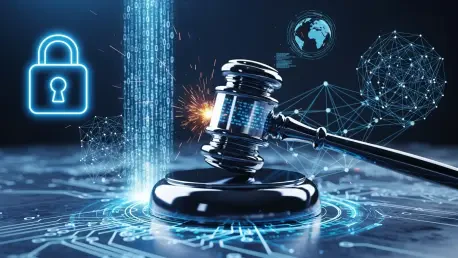In an era where digital infrastructure underpins nearly every facet of public life, the security of sensitive government systems has never been more critical, especially following a recent breach in a U.S. court case management system that exposed glaring vulnerabilities, sparking intense scrutiny over the robustness of cybersecurity measures. This incident has raised serious questions about whether the protections safeguarding judicial data are sufficient to withstand increasingly sophisticated cyber threats. The breach not only jeopardized confidential legal information but also heightened broader concerns about potential impacts on national security and public trust in the justice system. As hackers continue to target high-value institutions, the urgency to fortify these systems cannot be overstated. Senator Ron Wyden, a staunch advocate for digital security, has called for an immediate and comprehensive review of the cyber posture of court systems to prevent future attacks. This situation serves as a stark reminder of the stakes involved and sets the stage for a deeper examination of current defenses and necessary reforms.
Exposing the Vulnerability: Details of the Recent Breach
The recent hack into a U.S. court case management system revealed just how exposed critical judicial infrastructure can be to malicious actors. This breach, which compromised sensitive data related to ongoing legal proceedings, demonstrated the ease with which attackers could infiltrate systems lacking modern security protocols. Such an incident could disrupt court operations, leak personal information of individuals involved in cases, and even undermine the integrity of legal outcomes. While specific details about the attack remain under investigation, initial reports suggest that outdated software and insufficient access controls may have played a role in allowing unauthorized entry. The fallout from this event extends beyond immediate data loss, as it erodes confidence in the ability of government entities to safeguard essential information. This breach is not an isolated case but part of a troubling pattern of cyberattacks targeting public institutions, highlighting the need for systemic change in how cybersecurity is prioritized.
Beyond the immediate consequences of the breach, the incident has ignited a firestorm of concern among policymakers and security experts alike about the readiness of court systems to counter digital threats. The fact that such a vital system could be penetrated raises questions about the adequacy of existing budgets and resources allocated to cybersecurity. Many court systems still rely on legacy technology that cannot keep pace with the evolving tactics of cybercriminals, leaving them as easy targets. Moreover, the lack of standardized security protocols across different jurisdictions exacerbates the problem, creating uneven levels of protection. Senator Wyden’s urgent call for a review underscores the gravity of the situation, pushing for a thorough assessment to identify weak points and implement stronger defenses. Without swift action, the risk of further breaches looms large, potentially causing irreparable damage to the judicial process and public safety.
The Bigger Picture: Rising Cyber Threats to Public Institutions
Cyberattacks on public institutions have surged in recent years, with U.S. court systems emerging as particularly attractive targets due to the sensitive nature of the data they hold. Hackers, whether motivated by financial gain, political agendas, or sheer disruption, recognize the high value of judicial information, which can include case details, personal records, and classified documents. The implications of such breaches extend far beyond the immediate loss of data, as they can compromise ongoing investigations, expose witnesses to danger, and even influence legal outcomes through manipulation. As cyber threats grow more sophisticated, employing tactics like ransomware and phishing schemes, the pressure mounts on government agencies to stay ahead of the curve. The recent court system hack serves as a wake-up call, illustrating how unpreparedness can lead to catastrophic consequences in an increasingly interconnected digital landscape.
Addressing this escalating threat requires more than just reactive measures; it demands a proactive overhaul of how cybersecurity is approached within the public sector. Many experts argue that federal and state court systems must adopt a unified framework for digital defense, incorporating advanced technologies like artificial intelligence to detect and mitigate threats in real time. Additionally, regular audits and mandatory training for personnel can help close gaps that hackers often exploit through human error. The challenge lies in securing adequate funding and political will to implement these changes, especially when competing priorities often overshadow cybersecurity needs. Without a concerted effort to modernize and standardize protections, public institutions risk becoming perennial targets for cybercriminals. The recent breach is a stark indicator of the broader vulnerabilities that persist, urging immediate attention to fortify systems against an ever-evolving array of digital dangers.
Policy Push: Senator Wyden’s Call for Action
Senator Ron Wyden’s response to the recent court system hack has brought much-needed attention to the critical state of cybersecurity in the judicial sector. His demand for a comprehensive review of the cyber posture of U.S. court systems emphasizes the urgency of addressing systemic weaknesses before more damaging breaches occur. Wyden has long championed stronger digital protections across government entities, and this latest incident reinforces his argument that outdated infrastructure and inadequate safeguards pose a direct threat to justice and public trust. His proposal calls for a detailed examination of current security measures, identifying gaps, and developing a roadmap for modernization. This push for accountability signals a potential turning point in how cybersecurity is prioritized, urging officials to treat digital defense as a fundamental component of national security rather than an afterthought.
The implications of Wyden’s advocacy extend beyond mere policy recommendations, as they highlight the need for collaboration between federal and state levels to create a cohesive cybersecurity strategy. Implementing his vision would likely involve significant investment in updated technology, enhanced encryption methods, and robust incident response protocols tailored to the unique needs of court systems. Furthermore, fostering partnerships with private sector experts could accelerate the adoption of cutting-edge solutions, ensuring that judicial data remains secure against sophisticated attacks. However, challenges remain in rallying bipartisan support and securing the necessary funding to enact these reforms. The senator’s call to action serves as a catalyst for broader discussions on how to protect critical infrastructure, pushing for a cultural shift in recognizing cybersecurity as an essential pillar of governance. Only through such determined efforts can the vulnerabilities exposed by the recent hack be effectively addressed.
Charting the Path Forward: Strengthening Digital Defenses
Looking back at the recent breach of a U.S. court case management system, it became evident that the incident was a critical warning of the fragilities within judicial cybersecurity frameworks. The exposure of sensitive data due to outdated systems and lax protocols underscored a pressing need for reform that could no longer be ignored. Reflecting on the event, it was clear that the lack of preparedness had far-reaching consequences, from compromising legal proceedings to diminishing public confidence in the justice system. Senator Wyden’s urgent plea for a thorough review resonated as a necessary step to uncover and rectify the deficiencies that allowed such a breach to happen. This moment in time marked a crucial opportunity to reassess and reinforce the digital barriers protecting vital government information.
Moving ahead, the focus must shift toward actionable solutions that prevent history from repeating itself. Investing in state-of-the-art cybersecurity technologies and mandating regular system updates can form the backbone of a resilient defense strategy. Equally important is the establishment of standardized security policies across all court jurisdictions to eliminate disparities in protection levels. Collaboration with cybersecurity experts and increased funding allocations should be prioritized to ensure that resources match the scale of the threat. Additionally, cultivating a culture of vigilance through ongoing training for court personnel can mitigate risks posed by human error. As cyber threats continue to evolve, adopting a forward-thinking approach with continuous evaluation and adaptation of defenses will be essential to safeguard judicial integrity and public trust in the long term.









